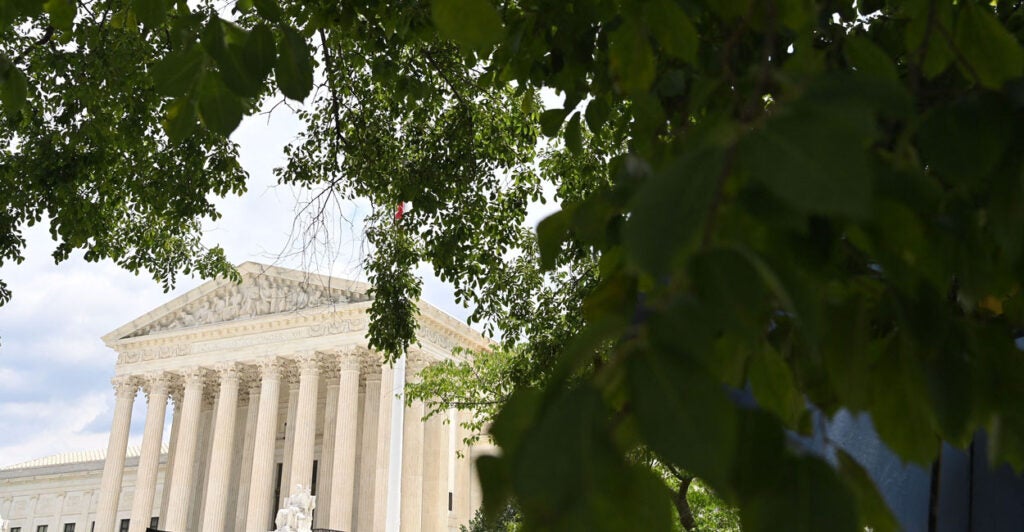What would it take for the American Civil Liberties Union and the Independent Women’s Law Center, the People for the Ethical Treatment of Animals and the Gun Owners of America, and the Human Rights Campaign and the Proposition 8 Legal Defense Fund to be found in the same trench fighting the same opponent? Nothing less than the right to the freedom of association, which the Supreme Court has held is implicit in the First Amendment.
In Americans for Prosperity Foundation v. Bonta, the Supreme Court on Thursday held by a 6-3 majority that California violated that right by demanding that charitable organizations disclose their major donors as a condition of fundraising in the state.
Charitable organizations in California that solicit contributions are required by state law to register with the state and provide reports that include their federal IRS Form 990. While most Form 990 information is public, federal law requires that “Schedule B,” which lists an organization’s “substantial donors,” be kept confidential.
Americans for Prosperity and the Thomas More Law Center refused to provide their Schedule B’s to the state, and instead sued California. The risk of public disclosure of this sensitive information, they argued, violates the right of association, especially when California does not actually use it to investigate charitable misconduct.
In a 1958 landmark decision titled NAACP v. Alabama, the Supreme Court unanimously held that requiring disclosure of a group’s members “may constitute as effective a restraint on freedom of association as [other] forms of government action.” Not surprisingly, the NAACP joined an amicus brief defending the same principle in today’s case.
An important issue in the case was the legal standard that should be applied in such compelled disclosure cases. The tougher the standard, the closer the connection must be between what the government wants to do and its reason for doing it.
The district court applied a standard called “exacting scrutiny,” which requires that government action be “substantially related to a sufficiently important governmental interest.” This standard, according to the district court, further requires that the action be “narrowly tailored” for the government’s purpose.
This is a rigorous standard, meant to minimize the possibility that government actions deter people from exercising their First Amendment freedom of association.
The U.S. Court of Appeals for the 9th Circuit reversed the district after applying a more lenient version of the “exacting scrutiny” standard that did not require this “narrowly tailored” connection. The Supreme Court agreed with the district court that the state’s action must “be narrowly tailored to the government’s asserted interest.”
The Supreme Court found a “dramatic mismatch” rather than a close connection between California’s “dragnet for sensitive donor information” and its claimed objective of preventing charitable fraud. California had not only previously failed to enforce its Schedule B disclosure requirement, but did not actually use that information when it investigated charities.
Instead, the Supreme Court found that California’s real reason for demanding this information was convenience, to simply have the information “close at hand, just in case” it might be useful. That was not nearly enough to justify the risk that the donor information might be disclosed.
Justice Sonia Sotomayor, joined by Justices Stephen Breyer and Elena Kagan, wrote in dissent that the majority had actually abandoned, rather than applied, the court’s precedents. She argued that, under those previous decisions, “reporting and disclosure requirements do not directly burden associational rights.”
Rather than the majority’s holding that an up-front disclosure requirement automatically violated the First Amendment, the dissenters would look at whether particular plaintiffs’ freedom of association had actually been affected.
The majority took note of the hundreds of organizations, “span[ning] the ideological spectrum,” that had filed briefs supporting the plaintiff groups in this case. They emphasized the “gravity of the privacy concerns” that any advocacy group would face from disclosure of donors.
“The deterrent effect feared by these organizations,” Chief Justice John Roberts wrote, “is real and pervasive.” The district court had cited evidence of “pervasive” Schedule B disclosures by the state as well as “ample evidence” that these particular organizations, their employees, and supporters could face hostility, intimidation, or harassment upon such disclosure. California’s “assurances of confidentiality,” the Supreme Court said, “are not worth much.”
Roberts concluded the court’s opinion with this important admonition: “When it comes to the freedom of association, the protections of the First Amendment are triggered not only by actual restrictions on an individual’s ability to join with others to further shared goals. The risk of a chilling effect on association is enough.”
That’s a freedom we all can share.
Have an opinion about this article? To sound off, please email letters@DailySignal.com and we’ll consider publishing your edited remarks in our regular “We Hear You” feature. Remember to include the URL or headline of the article plus your name and town and/or state.
